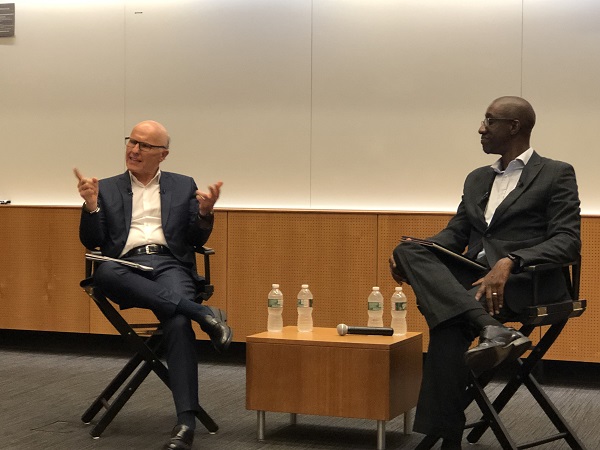At a Rutgers CUEED Talk, McCourt Predicts Next Generation of Internet Services Will Involve Machine-to-Consumer Interactions
Serial entrepreneur and author David McCourt said that the next generation of internet-based services will “cut out the middleman,” as intelligent machines regularly connect with consumers.
This was one of the predictions that McCourt made during a talk at Rutgers Business School in Piscataway, held on August 7. The discussion was moderated by Jeffrey Robinson, associate professor and academic director of the Rutgers Center for Urban Entrepreneurship & Economic Development, which hosted the event.
The billionaire entrepreneur, who made his fortune from buying and selling technology, media and telecommunications companies, told the audience that the twin engines of economic growth, technology and entrepreneurship, will power the internet’s next wave.
He said that there will be little need for middlemen, as they’ll be replaced by machines capable of communicating directly with consumers.
McCourt’s vision for a society increasingly reliant on technology is one of the themes of his latest book, “Total Rethink: Why Entrepreneurs Should Act Like Revolutionaries.”
In his book, McCourt contends that the next phase of the internet will be more disruptive than what businesses are experiencing today. As a result, many workers will have to acquire more skills, as new technologies replace jobs once performed by humans.
The self-made telecom tycoon also advised budding entrepreneurs to find a business niche they can exploit — something “that big business can’t do.” Among such opportunities are potential ways to reduce spiraling healthcare, education and housing costs, which McCourt blames for the widening wealth gap in this country.
Don’t count on the government or large corporations to lead the way toward solving these persistent economic problems, said McCourt. That’s because they both have vested interests in maintaining the status quo, so they will resist the adoption of any entrepreneurial approach that would expedite the process of finding solutions.
“We need a different way of addressing our problems, and not in an incremental way,” he said.
McCourt recalled the time when he sought advice from one of his high school teachers on how to find answers to algebra problems he was struggling with. The teacher told the young McCourt that if he wanted to solve a complicated problem, he should break it down into small pieces.
He used that anecdote to underscore the importance of technology, and how it can “get to the root of the problems” that exist today.
McCourt said that his growing up in a blue-collar, Irish-American household in a Boston suburb had served as the foundation for his restless entrepreneurial spirit, which eventually led to his acquiring more than 20 companies in nine countries over the past three decades.
The cable TV pioneer, whose first company became the largest privately owned designer and builder of cable systems in the early 1980s, experienced some setbacks while building his business empire. One of them was the 2004 bankruptcy of cable TV provider RCN Corporation (Princeton), of which McCourt was the chairman and CEO.
But RCN’s bankruptcy didn’t deter McCourt from pursuing his entrepreneurial way of life. He went on to become the producer of highly acclaimed TV shows and movies and continues to invest in telecom and other tech companies.
McCourt believes that a business failure should not discourage entrepreneurs from chasing their dreams. If it does happen, they will likely find support from others when their venture goes south.
“In America, if you fail, the community will help you back up,” McCourt said. “America loves a comeback story.”
Entrepreneurs seeking funding will have greater success with investors if they can clearly articulate the need for their business, rather than boasting about their career achievements and educational background, according to McCourt. “The step that most entrepreneurs forget is to tell a story why there’s a reason their business exists.”




